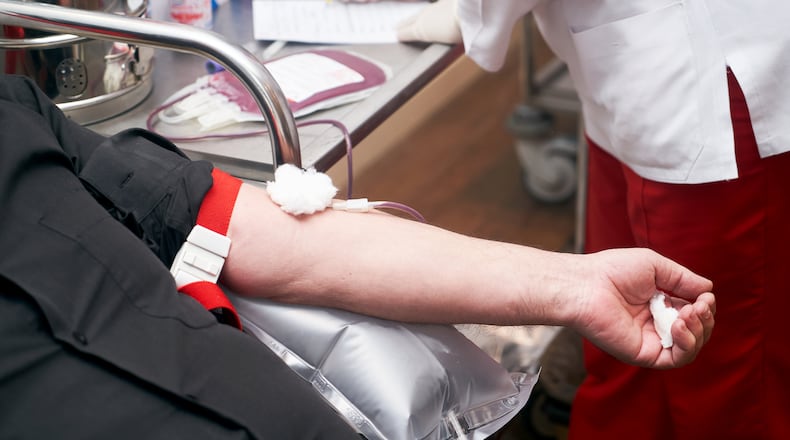With the blood supply falling to critically low levels, the American Red Cross of Georgia is hosting hundreds of blood donation drives throughout the state.
Here’s a few answers to common questions about blood donation.
Credit: HYOSUB SHIN / AJC
Credit: HYOSUB SHIN / AJC
How long does it take?
Whole blood donation: The actual blood donation only takes 8 to10 minutes. The entire donation process takes about an hour.
Platelet donation: This involves a special machine that isolates and takes just the blood platelets, then returns the other blood components — plasma, red cells and white cells — back to the donor. This process takes longer, about three hours.
What is the process?
It begins with a registration. Donors must show an ID and answer some questions online or a private interview and a brief general health check. Donors are then seated while a pint of blood is drawn. After donating blood, donors get a snack and drink, and after about 10 to 15 minutes, they can resume their day like normal.
The blood is tested and sent to a patient in need.
Credit: Phil Skinner
Credit: Phil Skinner
How do you prepare?
Before the blood donation: Eat well and hydrate the night before donating blood. The day of your appointment have a healthy meal and drink an extra 16 ounces of water before you go to the donation center. If you have hard-to-find veins, drinking extra water is especially helpful as it increases the volume of blood and makes veins easier to spot. Eating and drinking beforehand also reduces the chances of feeling faint when donating blood.
Who can donate blood?
To donate blood, you need to be:
— In good general health and feeling well.
— At least 17 years old in Georgia and most states. (Some states allow children as young as 16 years old to donate blood with parental consent.)
— Weigh at least 110 pounds.
— Have not donated blood in the last 56 days.
More gay and bisexual men are now able to donate blood. In August 2023, the American Red Cross implemented the U.S. Food and Drug Administration’s updated final guidance which dropped all restrictions specific to gay and bisexual men donating blood, moving to a new blood donation risk assessment tool that is the same for every donor regardless of sexual orientation.
Reasons people may not be able to donate blood:
— People sick with the flu or COVID or any other illness should not donate blood.
— People taking most medications can still donate blood, but some medications may require a waiting period after a final dose before a donation. Those taking taking an antibiotic for a bacterial infection, for example, must take the last dose by the date of blood donation.
— You may be deferred from donating blood or platelets if you have lived in or traveled to a malaria-risk country in the past three years.
Credit: custom
Credit: custom
Afraid of needles?
You are not alone if you feel your anxiety level rising as you anticipate the needle stick. Let the staff know that you are feeling nervous, and they’ll try to put you at ease. Avoid looking at the needle site. If you accidentally catch a glimpse of the blood bag or the needle site, try to stay positive and think about helping others with your blood donation.
Want to find a blood drive?
Go to www.redcrossblood.org to find a blood drive near you. People are encouraged to register in advance but walk-ins are welcome.
About the Author
Keep Reading
The Latest
Featured




